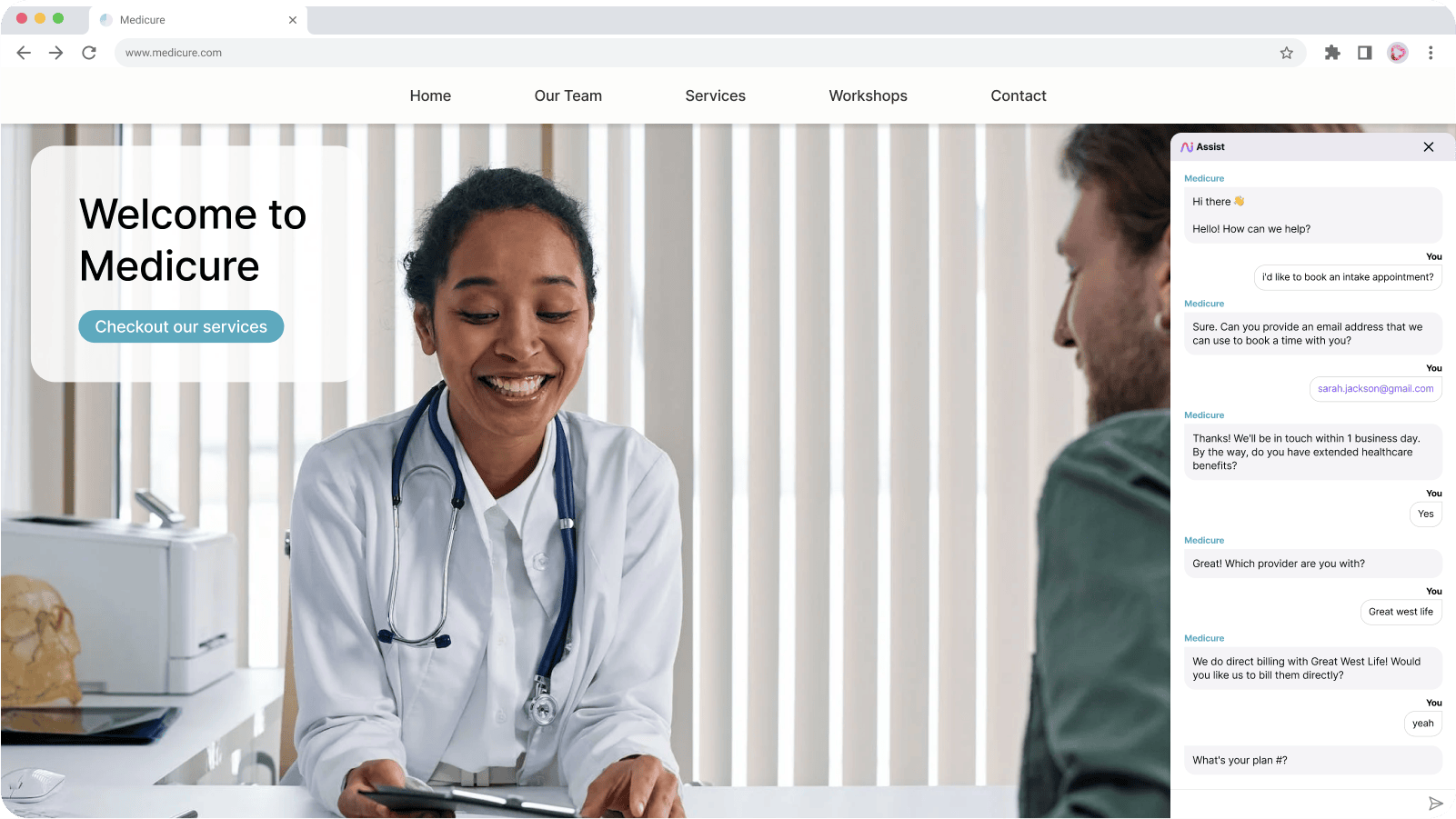
Tags
Share
In recent years, healthcare chatbots have revolutionized the way patients interact with healthcare providers. These digital assistants are designed to streamline processes, improve patient care, and enhance overall efficiency. But what exactly is a healthcare chatbot, and why should healthcare organizations consider integrating them into their operations?
In this article, we'll explore the different types of healthcare chatbots, their various use cases, and the significant benefits they offer to both providers and patients. We'll also take a look at the future of chatbot technology in healthcare and why Dialpad's solutions stand out.
Types of chatbots in healthcare
Healthcare chatbots come in various forms, each designed to address specific needs within the healthcare ecosystem. Understanding the different types can help organizations decide which chatbot solutions are best suited for their particular requirements.
Informative chatbots
Informative chatbots provide patients with essential information, such as health tips, medication reminders, and general medical advice. These chatbots are programmed to answer frequently asked questions and deliver educational content. They serve as a valuable resource for patients seeking quick answers without having to visit a healthcare provider.
Conversational chatbots
Conversational chatbots engage in natural, human-like conversations with patients. They can assist with scheduling appointments, answering queries, and providing personalized responses based on patient history and preferences. These chatbots enhance the patient experience by making interactions more engaging and efficient.
Prescriptive chatbots
Prescriptive chatbots go a step further by offering recommendations based on patient data. These chatbots can guide patients through symptom checkers, suggest treatment options, and even remind patients to take their medications or follow up on appointments. They play a crucial role in proactive patient care management.
Healthcare chatbot use cases
Healthcare chatbots are versatile tools that can be utilized in numerous ways to improve patient care and streamline healthcare operations. Here are some of the principal use cases where chatbots are making a significant impact.
Providing information
Healthcare chatbots can disseminate critical information to patients, such as details about symptoms, treatments, and preventive measures. This can be particularly useful for educating patients about chronic conditions or new health threats.
Scheduling appointments
One of the most common uses of chatbots in healthcare is to assist with scheduling appointments. Patients can interact with the chatbot to find available slots, book appointments, and receive reminders.

Diagnosing symptoms
While not a replacement for professional medical advice, chatbots can help patients identify potential conditions based on their symptoms. By guiding patients through a series of questions, chatbots can provide preliminary assessments and suggest next steps.
Providing emotional support
Chatbots can offer emotional support to patients dealing with anxiety, depression, or other mental health issues. These chatbots can provide coping strategies, mindfulness exercises, and resources for further help.
Managing chronic conditions
For patients with chronic conditions, chatbots can be an invaluable tool for managing their health. They can provide reminders for medication, track symptoms, and offer advice on lifestyle changes.
Benefits of chatbots in healthcare
The adoption of chatbots in healthcare comes with numerous advantages that can significantly enhance the quality of care and operational efficiency.
24/7 Availability
One of the most significant advantages of healthcare chatbots is their availability around the clock. Patients can access information and support at any time, without having to wait for office hours.
For example, a patient experiencing mild symptoms late at night can interact with a healthcare chatbot to receive preliminary advice and decide whether they need to visit an emergency room. This constant accessibility ensures that patients always have a reliable source of information and support, enhancing overall patient satisfaction and trust.
Cost-efficiency
Implementing chatbots can reduce operational costs for healthcare providers. By automating routine tasks and reducing the need for administrative staff, chatbots can help save money.
For instance, a chatbot can handle appointment scheduling and patient inquiries, freeing up human resources for more complex tasks. This reduction in administrative workload allows healthcare facilities to allocate resources more efficiently, ultimately lowering operational expenses and improving the bottom line.
Data collection
Chatbots can collect valuable data on patient interactions, preferences, and health conditions. This data can be used to improve patient care and optimize healthcare services.
For example, a chatbot can track patient symptoms over time and alert healthcare providers if there are any concerning patterns. This continuous data collection and analysis enable healthcare professionals to make more informed decisions and tailor treatments to individual patient needs, resulting in better health outcomes.
Personalization
Chatbots can offer personalized experiences for patients by leveraging their medical history and preferences. This can lead to better patient engagement and satisfaction.
For example, a patient with diabetes using a healthcare chatbot can receive customized advice on diet and exercise based on their specific condition and lifestyle. The chatbot can also send personalized reminders to take medication or schedule regular check-ups, ensuring that the patient receives care that is tailored to their unique needs.
Healthcare chatbot development: What might the future look like?
As technology advances, the capabilities of healthcare chatbots will continue to grow. We can expect more sophisticated AI-driven chatbots that can handle complex medical queries, provide advanced diagnostic support, and integrate seamlessly with other healthcare technologies.
Dialpad's chatbot software is an excellent choice for healthcare organizations looking to enhance patient care and streamline operations. With advanced conversational AI, Dialpad’s chatbots can handle a wide range of tasks, from answering patient queries to scheduling appointments and beyond.
Leveraging chatbots and conversational AI in healthcare
The use of AI in healthcare is on the rise, and chatbots are at the forefront of this transformation. By improving access to information, streamlining processes, and enhancing patient care, healthcare chatbots are poised to become an integral part of the healthcare landscape.
For organizations looking to stay ahead, integrating chatbots into their healthcare contact centers is essential. Check out our guide on healthcare contact center best practices to learn more, or request a demo of Dialpad’s chatbot support today!

